City Government
The First Days of the City of Peachtree Corners
Published
3 years agoon
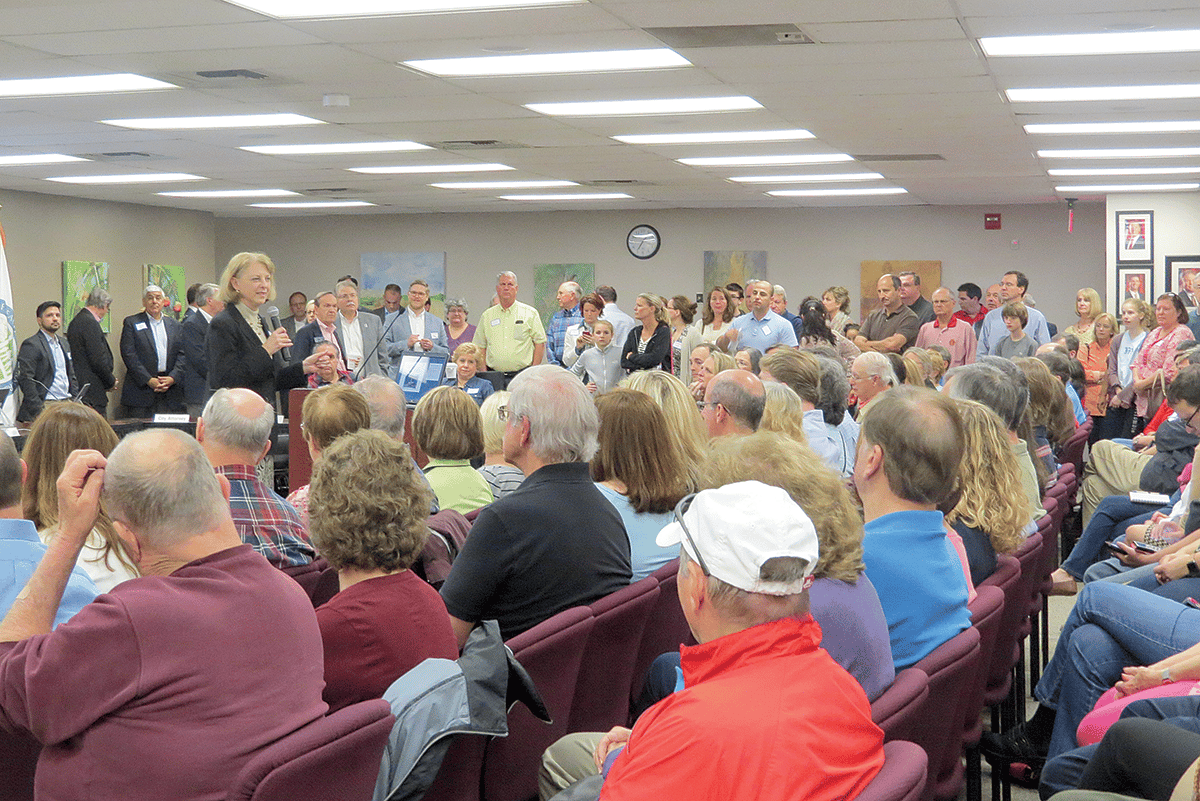
Peachtree Corners Community Development Director and first full-time city employee Diana Wheeler recount the early days.
Ten years ago, when I was offered the opportunity to become Peachtree Corners’ first employee, I eagerly accepted because I thought that with over 25 years of government experience, I could make a real contribution to this new city.
I didn’t realize until I visited the first City Hall building for the very first time that I would be contributing more than just my knowledge and experience. I would also be contributing my cell phone, car, laptop and credit card.
The fledgling city of Peachtree Corners had a framework for governance in place and several part-time consultants to manage operations, but there were no other permanent employees or much of anything else. The space that had been leased for City Hall was an old, empty building with glass walls and a poor ventilation system.
I had my pick of any empty office I wanted. With my architectural training and an understanding of the building’s orientation, I could tell immediately that I would have a choice of either being too cold in the winter or too hot in the summer. (I went with too cold in the winter and invested in a space heater.)
Setting, and resetting, priorities
I spent that first morning in August 2012 making a list of everything that needed to be done and then got to work on my list. The first item was a call to the cable company to sign up for internet service. There was only so much I could do on my phone. Without computers and internet, there would be no way to start up this start-up.
Next on my list was a trip to a used furniture store to see about buying desks, chairs, file cabinets and other essentials. There was no time to order new furniture and wait for delivery. I needed to buy things that were on-hand — or second hand. Fortunately, six matching office sets were found, and I told the salesperson that I would take them all.
I was feeling a great sense of accomplishment until he asked how I wanted to pay for them. I told him that the furniture was for the City of Peachtree Corners and asked if he could create an account for the city. He said he never heard of Peachtree Corners, but he could set up an account if it was tied to a credit card or a bank account.
Well, of course, Peachtree Corners had neither, so I contributed the use of my credit card and hoped that the purchase cleared. Luckily, it was the beginning of the month, so the transaction was approved — and I was off to my newly re-prioritized next destination: the bank.
All went well there, but I thought it might still be prudent to call my credit card company and see if they would raise my card limit. They did and that made me happy until I started to think about explaining the next month’s credit card bill to my husband.
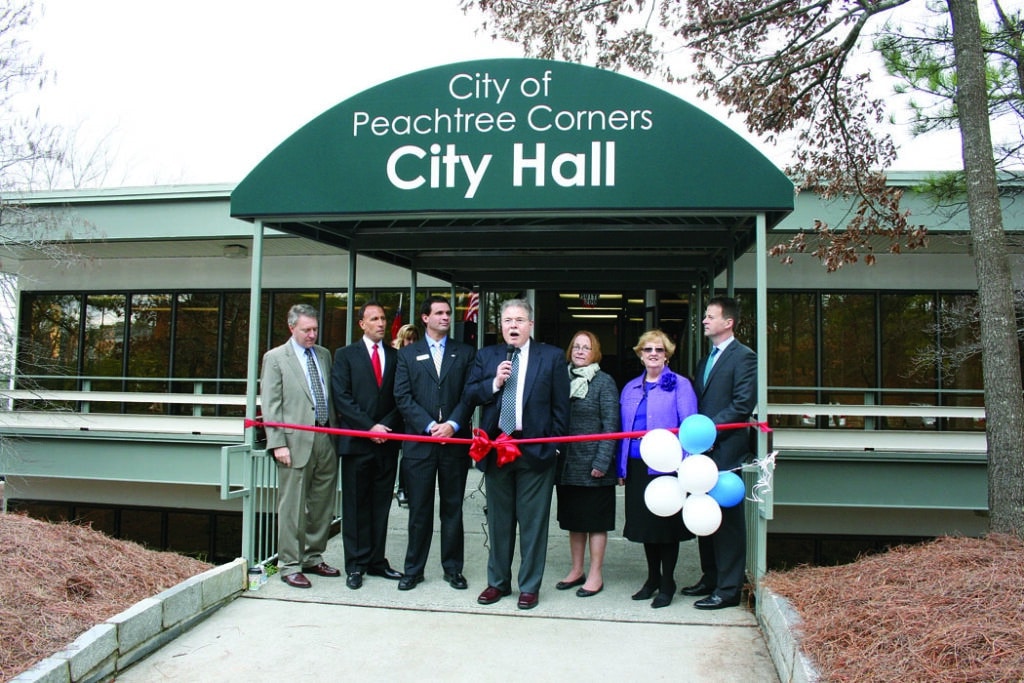
January 2013
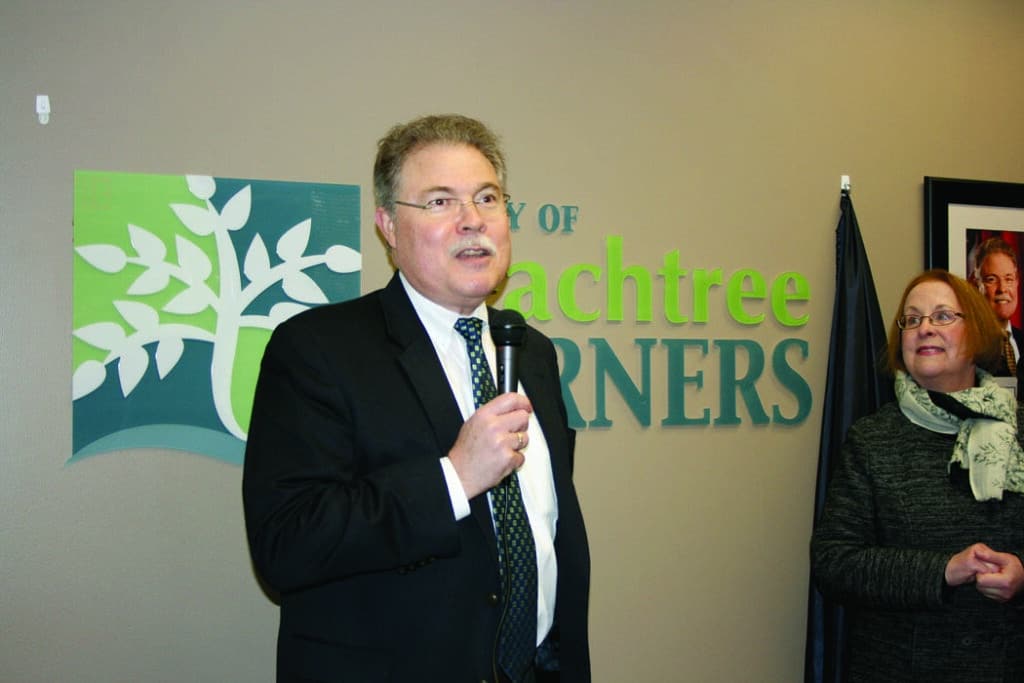

Challenges and accomplishments
Over the next few weeks, I worked to secure office equipment, including copy machines, a plotter (for maps and plans) and AV equipment, as well as basic office supplies. Fortunately, my credit card with its increased spending limit was up to the challenge and carried us over until the bank issued the city a line of credit.
Meanwhile, without the benefit of coworkers, I often needed to find creative solutions to routine challenges. For example, when trash got dumped along Peachtree Corners Circle, I reached out to Gwinnett’s Sheriff Department and made arrangements for an inmate work crew to pick it all up. And when deliveries were made to City Hall that I couldn’t physically manage, a staffing agency sent folks with strong arms to assist.
I even put my family to work. Large tables and file cases with drawers were needed for building plan review and large format projects, so my husband Robert and son John assembled big IKEA dining room tables and cabinets that were later outfitted with glass tops. They worked hard interpreting Swedish instructional hieroglyphics over the course of a weekend, and I supplied a picnic lunch of peanut butter sandwiches, because a refrigerator hadn’t yet been purchased for the break room.
Celebration for the new city
One of the biggest challenges came at the beginning of December 2012 when the City Council announced that there would be a Grand Opening of City Hall with an open house in January — and the entire community would be invited.
It seemed like an impossible goal, but the City Council had just hired City Clerk Kym Chereck and that made all the difference. The two of us worked with a consultant, developed an action plan, delegated assignments — and everyone got very, very busy.
We worked up until the very last minute. A Boy Scout troop was even recruited to raise the flag at City Hall on opening day. It didn’t occur to me until the week before that the national anthem should be played when the flag is raised for the first time. It was too late to solicit a volunteer, so again, I pressed my good-natured, trumpet player son John into service. He did an admirable job and set the tone for a jubilant day.
The highlight of the Grand Opening came when Mayor Mike Mason unveiled the city name and logo on the wall of the new Council Chambers. The unveiling generated a standing ovation and marked the realization of a dream for all those involved and for a brand-new city. It was a truly remarkable achievement.
And 10 years later, we’re still living the dream. Happy Birthday, Peachtree Corners! ■
Related
City Government
Brandon Branham Honored for Transformative Leadership in Peachtree Corners
Published
2 weeks agoon
May 20, 2025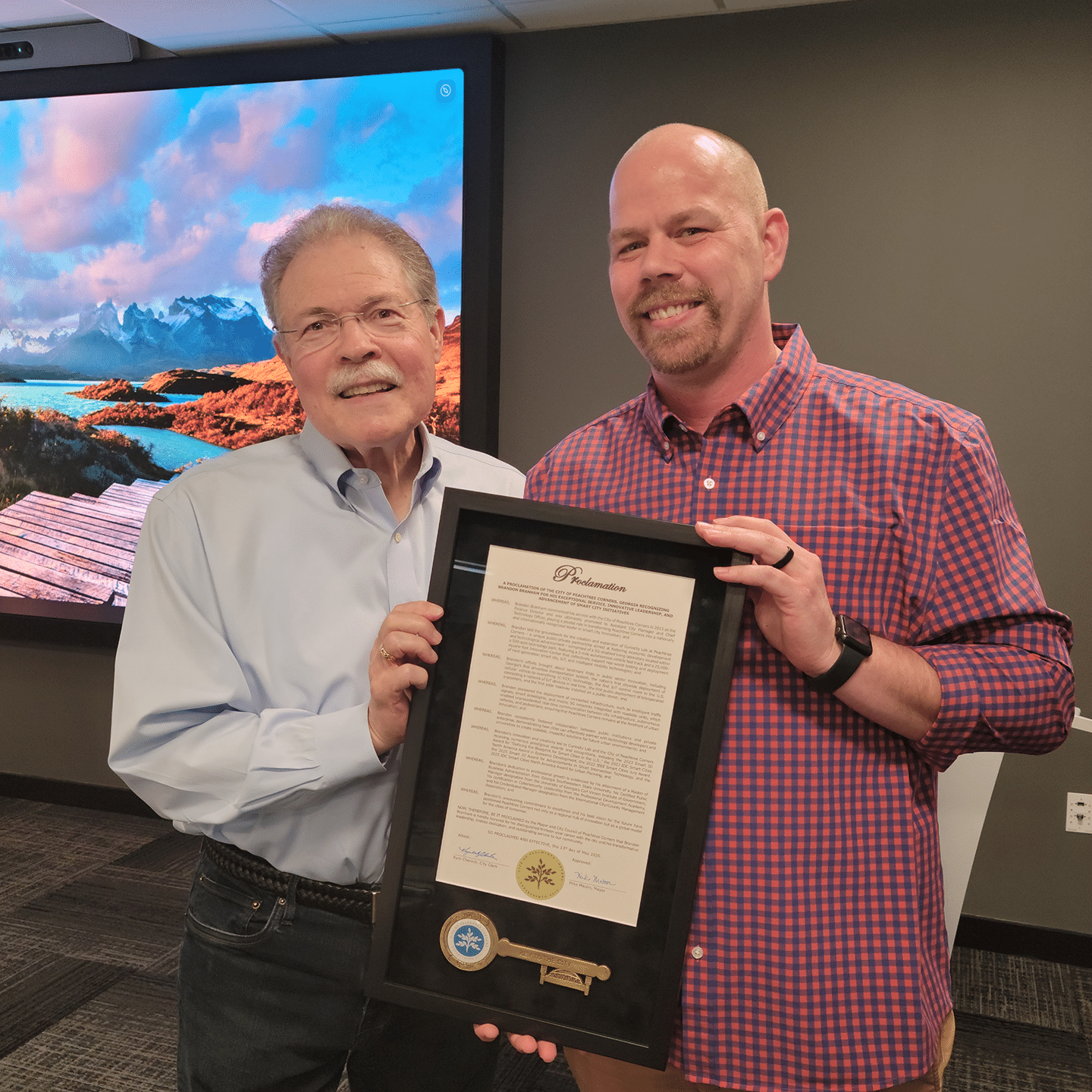
The City of Peachtree Corners recently honored Assistant City Manager Brandon Branham with an official proclamation for his years of leadership and service to the city.
Branham began his tenure in 2013 as finance director and was later promoted to assistant city manager and chief technology officer. In each of those roles, he’s played an instrumental part in guiding Peachtree Corners’ transformation from a suburban community into an internationally recognized hub of technology and innovation.
A decade of accomplishments
Among his many accomplishments, Branham spearheaded the development of the Curiosity Lab at Peachtree Corners, a 5G-enabled living laboratory and innovation center located within a 500-acre technology park.
Under his leadership, the city also achieved numerous national firsts in public sector technology, including the launch of Georgia’s first driverless shuttle system, the country’s first citywide C-V2X (cellular vehicle-to-everything) deployment and the first solar roadway installed on a public street.
“Brandon’s vision and commitment to innovation have positioned Peachtree Corners at the forefront of smart city development not just in Georgia, but across the nation,” said City Manager Brian Johnson. “His leadership has shaped the future of our city, and we are deeply grateful for his service.”
Partnerships and collaborations
Throughout his twelve-year career with the city, Branham emphasized collaboration between the public and private sectors, creating partnerships with tech companies and academic institutions to pilot scalable, real-world solutions.
His efforts have garnered numerous accolades for Peachtree Corners, including multiple Smart Cities awards and recognition for urban planning and intelligent mobility technologies.
New opportunities
Now, as Branham prepares to leave his role and move on to new opportunities, the City of Peachtree Corners “extends its heartfelt appreciation and best wishes for his continued success.”
“Brandon has left a lasting legacy,” Johnson said. “We look forward to seeing the impact he’ll continue to make in the smart city space and beyond.”
Related
City Government
Peachtree Corners Hosts Discussion About the Future of Local Policing
Published
3 weeks agoon
May 12, 2025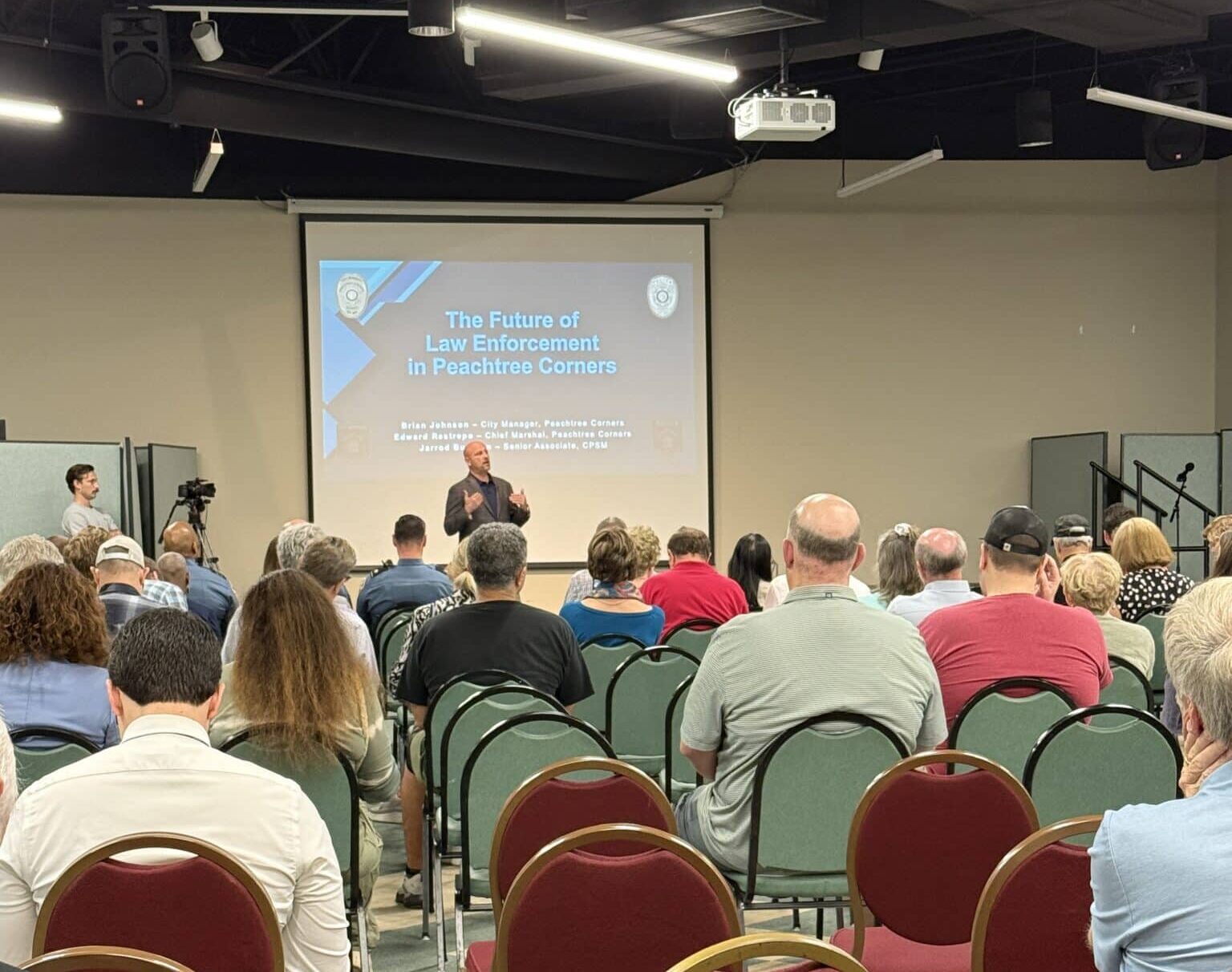
Although crime isn’t on the rise, and the Gwinnett County Police Department (GCPD) is fulfilling its role in fighting crime, the City of Peachtree Corners is asking residents, business owners and city stakeholders if they believe the city should form its own police department.
With over 100 people in attendance, City Manager Brian Johnson led the discussion about the future of policing in Peachtree Corners. He presented the findings from a survey conducted by the Center for Public Safety Management (CPSM), a nationally-recognized law enforcement consulting and training firm, as well as information about patrol officer staffing, response times, costs to tax payers and a potential timeline.
Ensuring public safety
Johnson kicked off his presentation by explaining that it is the duty of the mayor and city council to ensure public safety, including reviewing law enforcement.
“Maybe it needs to grow, maybe it needs to change its focus. But city council is the one that has the decision-making responsibility,” he said.
He was also adamant that this isn’t a done deal.

“I hit this point already, but I want to hit it again. This is the start of a conversation, a community conversation and feedback to council. There hasn’t been a decision,” he said. “Council has not received this presentation from me. They’re here to watch and learn from your feedback of this.”
Mayor Mike Mason was present at the meeting, along with all of the city council members except Eric Christ who was out of town and watching remotely.
Issues and obstacles
Johnson explained that the grounds for the inquiry were based on issues about communication, access to information and enforcement of city-specific ordinances. He cited an example where a city rule that private residences can’t be rented on a short-term basis like Vrbo or Airbnb wasn’t enforced by GCPD. An owner tried to circumvent the ordinance by only renting the outside of the house. A loud pool party ensued, and frustrated neighbors dialed 911.
“Officers showed up and they said, ‘We can’t enforce the city’s noise ordinance,’” Johnson said.
The first stage to fix this problem was creating the marshal program to bridge the gap between code enforcement and GCPD.
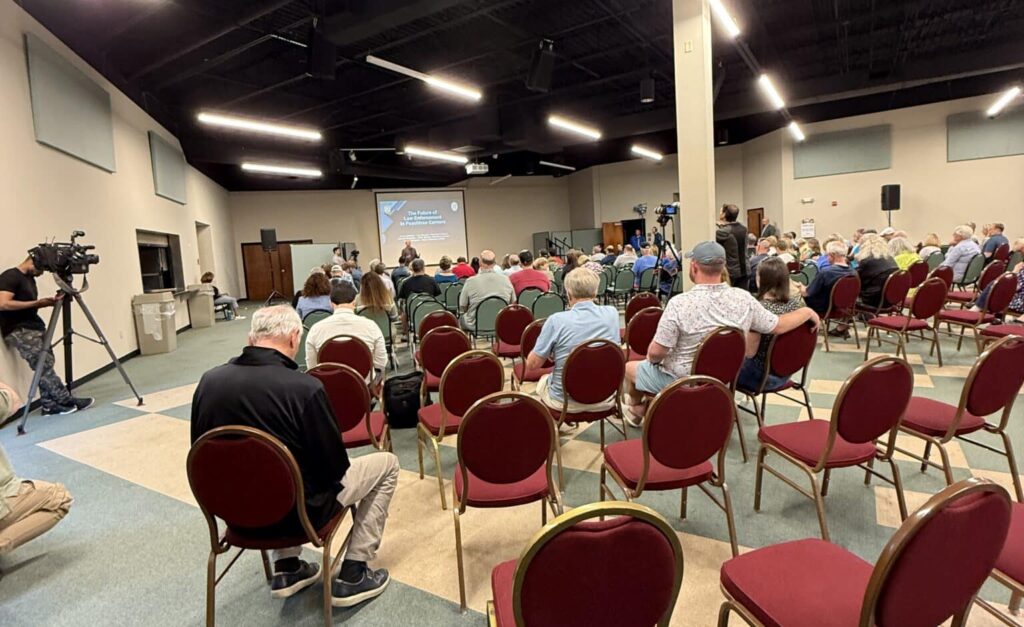
“[We thought] they would be able to enforce both local ordinance and state law, since they are a function of the city, and they could maybe be a force multiplier for Gwinnett since [marshals] don’t have to respond to 911 calls,” said Johnson.
But other issues arose shortly after the department was formed.
“We were still working towards getting that good balance, but we have been faced recently with a couple of things that make it harder for us,” said Johnson.
Seeking shared access
Instead of GCPD giving PTC marshals read-only, quick access to incident reports, dispatch calls and other information, the marshals department was required to file open records requests through the same process as any civilian.
“They were denied, as well as the city of Sugar Hill, [when] asked for the ability to see, not change, but see the computer-aided dispatch information, so that they would know where Gwinnett County police officers were; so that they could avoid stepping on their toes or maybe looking to support their efforts, and they haven’t been granted that,” said Johnson.
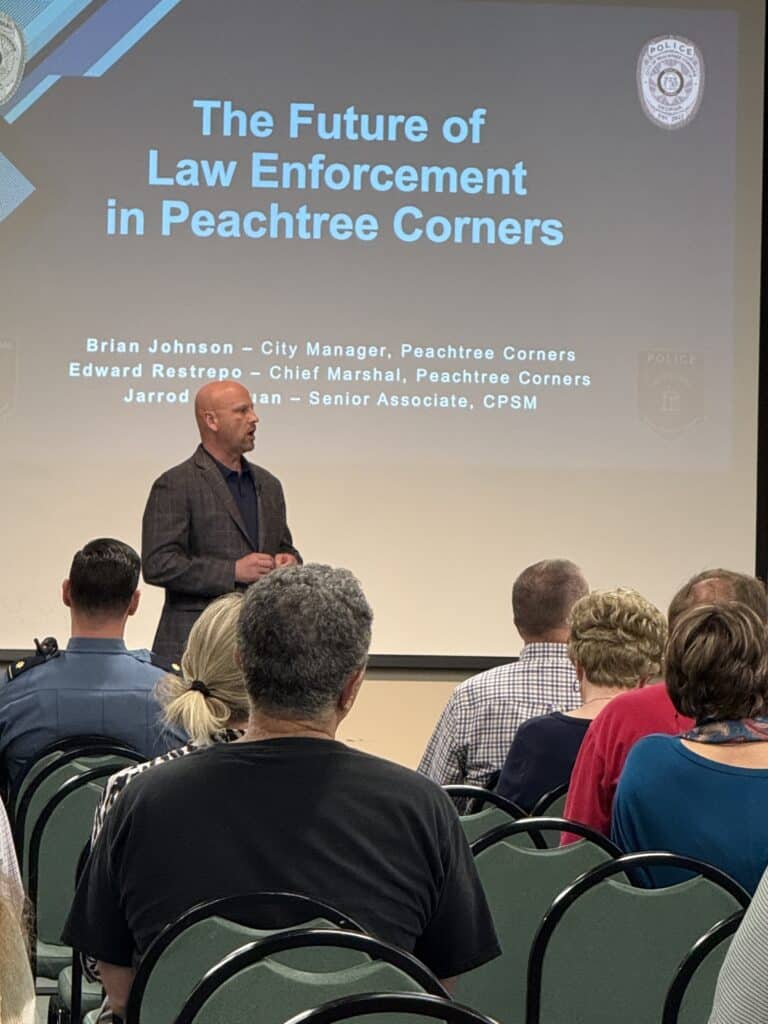
He added that the GCPD has video cameras on certain roadways that are used for various reasons, and law enforcement can use them when there’s crime in the area. Peachtree Corners marshals were denied access to those cameras.
“Conversely, we have a couple hundred cameras in the city, and we definitely want them to have access to them,” said Johnson. “So the frustration out of not being able to get that symbiosis between the marshals and police made us start thinking, all right, you know, is there another option?”
Community feedback
CPSM utilized data from GCPD to discern if Peachtree Corners could feasibly stand its own force. It also took into consideration crime trends, costs and many other factors. It recommended a 55-officer department, costing $12.1 million annually, with a $2.2 million upfront cost.
Comparing the two options to “renting vs. owning” the primary law enforcement agency in the city, Johnson presented pros and cons for each. Once the question-and-answer portion began, there was no obvious choice. Men and women, young and more advanced in age, had both similar and differing opinions.
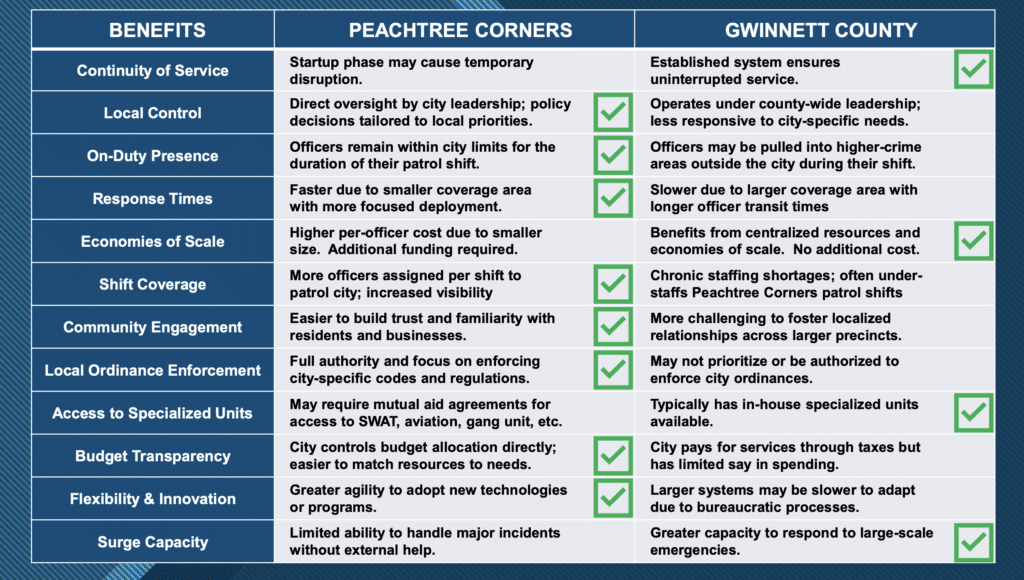
One young man, who identified himself as a local small business owner named Alexander, argued that with artificial intelligence increasing the efficiency of administrative tasks, perhaps the city wouldn’t need a full 68-man department of civilians and sworn officers.
Some accused the city of devising a solution in need of a problem. Others were concerned that paying approximately $100,00 for a study was throwing good money after bad.
But at the end of it all, the city is continuing to seek feedback and is encouraging everyone to make informed decisions. The meeting was taped and is available on the city website along with Johnson’s PowerPoint presentation, a copy of the study done by CPSM and a survey.
As far as a timeline goes, city officials would like folks to take the summer to mull it over and come back in the fall to take another look at the proposal.
Related
City Government
City of Peachtree Corners Awarded Certificate of Achievement From GFOA for Seventh Straight Year
Published
4 weeks agoon
May 9, 2025
The City of Peachtree Corners’ finance department has been awarded a Certificate of Achievement for Excellence in Financial Reporting from the Government Finance Officers Association of the United States and Canada (GFOA) for its 2024 financial year-end comprehensive annual financial report (CAFR).
The GFOA’s Certificate of Achievement is the highest form of recognition in governmental accounting and financial reporting, and its attainment represents a significant accomplishment by a government and its management.
It is the city’s seventh year of receiving the award and represents a significant accomplishment by the city’s finance department and its leadership.
According to a GFOA release, “The report has been judged by an impartial panel to meet the high standards of the program, which includes demonstrating a constructive ‘spirit of full disclosure’ to clearly communicate its financial story and motivate potential users and user groups to read the report.”
“We are pleased to again receive this honor,” said City Manager Brian Johnson. “Our finance department, and Finance Director Cory Salley, are to be commended for this achievement, as it is the highest form of recognition GOFA presents.”
A comprehensive annual report
The city’s finance department produces the CAFR each year and works with independent auditors to verify the city’s financial situation and standing.
“This prestigious award affirms Peachtree Corners’ dedication to exceeding basic requirements by producing comprehensive annual financial reports that reflect a strong commitment to transparency and full disclosure,” said Assistant City Manager Brandon Branham.
About the GFOA
The Government Finance Officers Association (GFOA), founded in 1906, represents public finance officials throughout the United States and Canada.
The association’s more than 20,000 members are federal, state/provincial and local finance officials deeply involved in planning, financing and implementing thousands of governmental operations in each of their jurisdictions. GFOA’s mission is to advance excellence in public finance.
To learn more about the GFOA, visit gfoa.org.
For more about the City of Peachtree Corners, visit peachtreecornersga.gov.
Related
Read the Digital Edition
Subscribe
Keep Up With Peachtree Corners News
Join our mailing list to receive the latest news and updates from our team.
You have Successfully Subscribed!

Guardians of the Jukebox to Play the VoxStage on May 31

“Geek Culture” Shines at 2025 MomoCon

Brandon Branham Honored for Transformative Leadership in Peachtree Corners

Music Matters Productions Expands Peachtree Corners Headquarters

Celebration and Community: ICAGeorgia Wraps Up School Year with Two Festive Events

Vox-Pop-Uli Launches RED Initiative for Veterans’ Support

The PCBA Awards $500 to Light Up The Corners at After-Hours Event

City Collaborates with DNR for Deer Overpopulation Solutions

City Collaborates with DNR for Deer Overpopulation Solutions

Peachtree Corners Festival Awards Debbie Mason Drama Scholarship for 2025

Vox-Pop-Uli Launches RED Initiative for Veterans’ Support

The PCBA Awards $500 to Light Up The Corners at After-Hours Event

“Geek Culture” Shines at 2025 MomoCon

Celebration and Community: ICAGeorgia Wraps Up School Year with Two Festive Events

Guardians of the Jukebox to Play the VoxStage on May 31

Music Matters Productions Expands Peachtree Corners Headquarters

Light up the Corners [Video]

Capitalist Sage: Business Leadership in Your Community [Podcast]

Cliff Bramble: A Culinary Adventure through Italy

Top 10 Brunch Places in Gwinnett County

A Hunger for Hospitality

THE CORNERS EPISODE 3 – BLAXICAN PART 1

Top 10 Indoor Things To Do This Winter

The ED Hour: What it takes to Remove Barriers from Education









